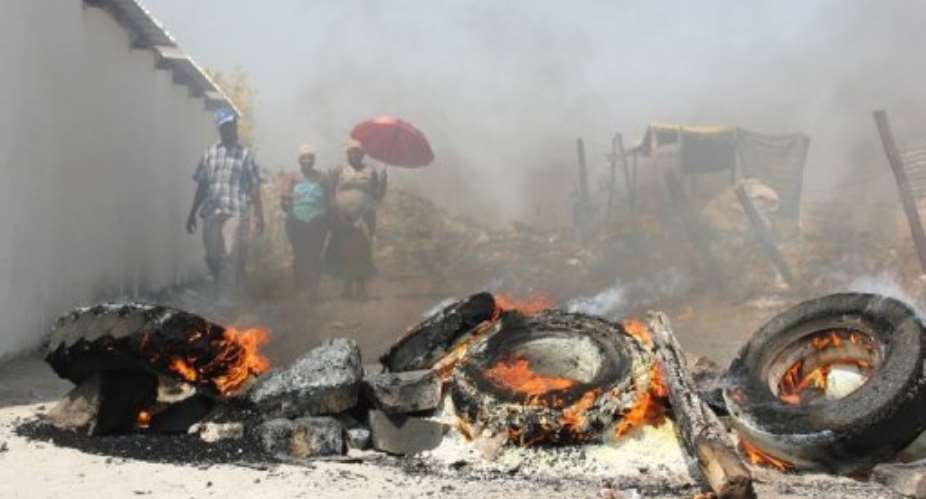RUSTENBURG, South Africa (AFP) - Clashes broke out between South African police and residents near a shaft of the world's top platinum firm Anglo American on Thursday, as miners at nearby Lonmin went back to work.
Residents blocked roads and police fired teargas and stun grenades to disperse them as the Anglo American (Amplats) workers faced a Thursday-night deadline to return to the job.
Mable Makgetla, 30, whose husband works for a mining contractor, had earlier claimed police fired rubber bullets "and afterwards they poured teargas, that's why we put the rocks."
Police denied using rubber bullets.
"There was an illegal gathering that took place this morning. Police used teargas as well as water cannon to disperse individuals," police spokesman Dennis Adriao told AFP. "Stun grenades were used as well."
Black smoke billowed in the Sondela informal settlement next to a shaft, as miners and residents blocked roads with rocks and burning tyres to keep the police out.
The unrest at Amplats in Rustenburg, about 120 kilometres (75 miles) northwest of Johannesburg, appeared to be escalating just as a deadly six-week strike at a nearby platinum mine run by Lonmin wound down.
The unrest had spread to Amplats from nearby Lonmin, where workers returned to work Thursday after a deal was brokered to end a crippling strike in which 46 people died.
The Lonmin workers' wage demands and threats of deeper strike action have been taken up by other gold and platinum miners, raising fears of a major economic fall-out.
Amplats reported a less than 20-percent turnout at four of its mines as it gave its workers an ultimatum to return to work by the Thursday night shift after declaring the strike action illegal.
"No one is willing to go back, absolutely no-one," workers representative Gaddhafi Mdoda said, adding that the area was relatively calm aside at one shaft.
The Lonmin deal has raised alarms of a dangerous precedent for the hammering out of worker wage demands, with the deal secured after workers bypassed recognised union structures and after shocking bloodshed.
"It is giving us an advantage just because ... Amplats can pay more than that," Mdoda said.
Workers will not go below demands for 12,500 rands (1,200 euros, $1,500), the same amount Lonmin staff had been pushing for, he said.
Though Lonmin's deal fell slightly short of that figure, the mine rebounded into action.
Workers chatted loudly as the queue shuffled to the turnstile entrance for the morning shift.
"We're happy to go to work. We got what we wanted," said Yandisa Mehlo, 37.
Others were less satisfied, but returned to work out of desperation after going without pay for over a month.
"I return to work because I'm so hungry," said Phumlile Macefane, 24, saying he was unhappy that he had not got the full amount.
Company spokeswoman Sue Vey said attendance had hit 77 percent after turnout had plunged to below one percent during the strike, which dated to August 10, at the world's number three platinum producer.
"No production is happening today because people are receiving safety briefings and briefings by the management regarding the strike," she said.
The breakthrough was bitterly won after the illegal strike sparked the worst police violence since the end of apartheid in 1994, with 34 people shot dead at the Marikana plant.
The latest fatality came Wednesday when a woman died after she was shot by police using rubber bullets in a weekend government-ordered crackdown.
Also Thursday, President Jacob Zuma said he was deploying troops to the platinum belt to help support the police crackdown after soldiers were sent to the area at the weekend.
The government has backed the crackdown, raising the alarm on production losses on mines which form the backbone of its economy.
The protests have also spread to Gold Fields near Johannesburg, which is losing 1,400 ounces of gold daily since 15,000 miners downed tools 11 days ago, also echoing the Lonmin strikers' wage demands.





 Dumsor: Don't rush to demand timetable; the problem may be temporary — Atik Moha...
Dumsor: Don't rush to demand timetable; the problem may be temporary — Atik Moha...
 Space X Starlink’s satellite broadband approved in Ghana — NCA
Space X Starlink’s satellite broadband approved in Ghana — NCA
 2024 election will be decided on the grounds of the economy; choice of running m...
2024 election will be decided on the grounds of the economy; choice of running m...
 Dumsor: We're demanding less; just give us a timetable — Kwesi Pratt to ECG
Dumsor: We're demanding less; just give us a timetable — Kwesi Pratt to ECG
 Do I have to apologise for doing my security work, I won’t – Simon Osei-Mensah r...
Do I have to apologise for doing my security work, I won’t – Simon Osei-Mensah r...
 All my businesses have collapsed under Akufo-Addo — NDC Central regional chair
All my businesses have collapsed under Akufo-Addo — NDC Central regional chair
 Military, Prison Officers clash in Bawku, three injured
Military, Prison Officers clash in Bawku, three injured
 GRA-SML contract: MFWA files RTI request demanding KPMG report
GRA-SML contract: MFWA files RTI request demanding KPMG report
 Court threatens to call second accused to testify if NDC's Ofosu Ampofo fails to...
Court threatens to call second accused to testify if NDC's Ofosu Ampofo fails to...
 Family accuses hospital of medical negligence, extortion in death of 17-year-old...
Family accuses hospital of medical negligence, extortion in death of 17-year-old...
